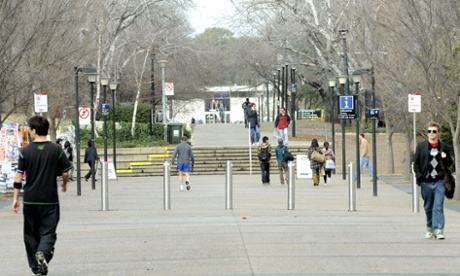Seven Australian universities feature in QS World University Rankings top 100 with University of Melbourne taking second spot

The Australian National University has moved into the top 25 universities in the world, jumping two rankings, with seven other Australian universities appearing in the top 100.
The QS World University rankings, which take into account, research and teaching at the university as well as employability post-degree, were released on Tuesday with ANU coming equal 25th on the list. The list was topped by Massachusetts Institute of Technology for the second year in a row.
The University of Melbourne was the second Australian university in the rankings, but dropped from 31st last year to 33 for 2014. The University of Sydney jumped one spot from 38 to 37 while the University of Queensland remained in 43rd place.
The University of New South Wales jumped four places from 52 to 48 while Monash University moved from 69th to 70th. The University of Western Australia also dropped in the rankings from 84 to 89 while the University of Adelaide was in 100th place, jumping from equal 104th in 2013.
The next Australian university on the list, Macquarie University, came in at 254th.
ANU acting vice-chancellor, Professor Margaret Harding, said the university’s top Australian ranking owed a lot to the quality of teachers at the university.
“Rankings are imperfect measures, and move around year to year, but they do tell you the company you are keeping,” she said in a statement.
“It is great to be alongside other great universities of the world like the National University of Singapore (22), Ecole normale supérieure, Paris (24), Duke University (equal 25) the University of California, Berkeley (27).”
Harding singled out Dr Steve Lee from the Research School of Engineering as an example of innovation at the university. Lee won this year’s Eureka prize for science for the invention of a cheap lens which can convert a smartphone into a microscope.
She said the international nature of the university was a fundamental element its global reputation.
“ANU brings Canberra to the world and the world to Canberra,” she said.
“That global nature carries across our teaching and research, from Nobel prize-winning research in astronomy and medical science, to hosting world leaders, including most recently the prime minister of Japan, Shinzo Abe.”
The QS rankings use six indicators to compile the results. These include data on staff to student ratios and how often the university’s research is cited, along with the results from global surveys of academics and employers.
